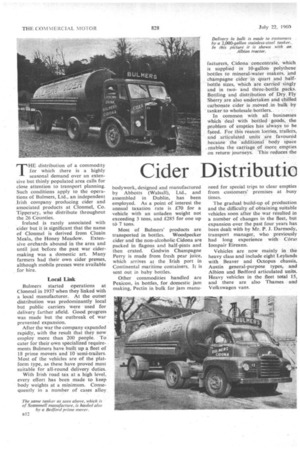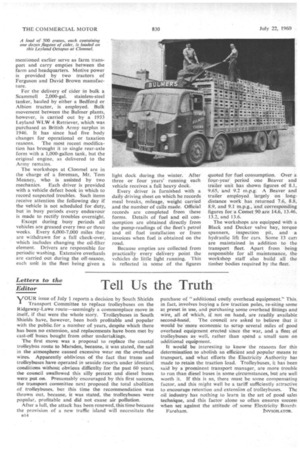Cider Distributio )emands Flexibility
Page 46

Page 47

Page 48

If you've noticed an error in this article please click here to report it so we can fix it.
Bulniers' Clonmel Fleet, Planned to Meet Heavy Seasonal Fluctuations, has Little Light Running By Ashley Taylor, A.M.I.R.T.E.
THE distribution of a commodity for which there is a highly seasonal demand over an extensive but thinly populated area calls for close attention to transport planning. Such conditions apply to the operations of Bulmers, Ltd., an independent Irish company producing cider and associated products at Clonmel, Co. Tipperary, who distribute throughout the 26 Counties.
Ireland is rarely associated with cider but it is significant that the name of Clonmel is derived from Cluain Meala, the Honey Meadow. Extensive orchards abound in the area and until just before the past war cidermaking was a domestic art. Many farmers had their own cider presses, although mobile presses were available for hire.
Local Link
Bulmers started operations at Clonmel in 1937 when they linked with a local manufacturer. At the outset distribution was predominantly local but public carriers were used for delivery farther afield. Good progress was made but the outbreak of war prevented expansion.
After the war the company expanded rapidly, with the result that they now employ more than 200 people. To cater for their own specialized requirements Bulmers have built up a fleet of 18 prime movers and 10 semi-trailers. Most of the vehicles are of the plat form type, as these have proved most suitable for all-round delivery duties. With Irish road tax at a high level. every effort has been made to keep body weights at a minimum. Consequently in a number of cases alloy bodywork, designed and manufactured by Abbotts (Walsall), Ltd., and assembled in Dublin, has been employed. As a point of interest the annual taxation rate is £70 for a vehicle with an unladen weight not exceeding 3 tons, and £285 for one up to 7 tons.
Most of Bulmers' products are transported in bottles. Woodpecker cider and the non-alcoholic Cidona are packed in flagons and half-pints and then crated. Godwin Champagne Perry is made from fresh pear juice, which arrives at the Irish port in Continental maritime containers. It is sent out in baby bottles.
Other commodities handled are Pexicon, in bottles, for domestic jam making, Pectin in bulk for jam manu
facturers, Cidoria concentrate, which is supplied in 10-gallon polythene bottles to mineral-water makers, and champagne cider in quart arid halfbottle sizes, which are carriedsingly and in twoand three-bottle packs.
Bottling and distribution of Dry Fly Sherry are also undertaken and chilled carbonate cider is _moved in bulk by tanker to wholesale bottlers.
In common with all businesses which deal with bbttled goods, the problem of empties has always to be faced. For this reason lorries, trailers, and articulated units are favoured because the additional' body space . enables the carriage of more ,empties
on returnjourneys. Thisreduces the
need for special trips to clear empties from customers' premises at busy times.
The gradual build-up of production and the difficulty of obtaining suitable vehicles soon after the war resulted in a number of changes in the fleet, but expansion over the past four years has been dealt with by Mr. P. J. Darmody, transport manager, who previously had long experience with Coras lompair Eireann.
Vehicles are now mainly in the heavy class and include eight Leylands with Beaver and Octopus chassis, Austin general-purpose types, and Albion and Bedford articulated units. Heavy vehicles in the fleet total 15, and there are also Thames and Volkswagen vans. Because the size and frequency of orders vary greatly, there is no possibility of operating scheduled services.
Runs vary from day to day and full use is made of the flexibility provided by the somewhat mixed fleet. A depot maintained on the outskirts of Dublin receives large deliveries of bottled goods and from there local orders are delivered, usually by two of the Austins or a Leyland.
Owing to the great difference between summer and winter traffic the fleet must be run hard during the warmer months to ensure economic operation and a reasonable annual mileage. Because conditions are so different _from those in England, the shunt-driver system is practically non existent. However, Mr. Darmody has devised a driver interchange plan which ensures the most intensive use of the fleet during the peak period.
A driver, appointed to reside in the northwest of Ireland, has been supplied with a car to enable him to meet a vehicle running on night service from Clonmel. Because he has
his own transport -he can make the changeover at any suitable point, irrespective of the route being worked by the trunk vehicle.
The night driver arrives at the interchange point early in the morning and sleeps during the day. Meanwhile, the " floating " driver takes over the deliveries and returns the vehicle to the trunk man for the journey back to Clonmel. This reduces a three-orfour-day run to 36 hours and makes the unit available for a one-day run starting from headquarters on the morning of its arrival.
Continuity is maintained by sending out another trunk vehicle to the northwest while the first one is on the return journey. In this way it has been possible to obtain 1,800 miles from a 16-ton unit in one week without drivers working excessive hours. The normal working week for driving staff is 48 hours, with a limit of 57 hours in. any one week. Overtime work is not paid for, as the men take the appropriate time off in lieu.
Peak demands are frequently beyond the capability of the fleet and then assistance is sought from C.1.E. road services. On these occasions it is not Merely a matter of off-loading a few small consignments. Complete loads are . put out and at times of extreme pressure C.I.E. have provided a dozen or more large vehicles to meet the Bulmers demand.
A couple of years ago new legisla tion gave the Irish state transport undertaking far greater freedom than was previously enjoyed. Now it has absolute autonomy in the matter of rates, and the former statutory obligation to replace discontinued rail services by suitable, road facilities was removed. The result has been a more vital organization with a keener com petitive spirit.
As most deliveries are made to wholesalers, loading and unloading—
with one exception in Dublin—are performed manually. One Conveyancer fork-lift truck is now employed at Clonmel, but it seems likely that mechanical handling will be extended there. The problems of handling can readily be appreciated when it is realized that a full load for a Leyland Beaver and trailer might amount to 1,700 dozen half-pint bottles or 500 dozen flagons.
On an extensive farm where cider apples are grown, about three miles from Clonmel, additional storage space is available for housing vast quantities of empties. The trailers
mentioned earlier serve as farm transport and carry empties between the farm and headquarters. Motive power is provided by two tractors of Ferguson and David Brown manufact tire.
For the delivery of cider in bulk a Scammell 2,000-gal. stainless-steel tanker, hauled by either a Bedford or Albion tractor, is employed. Bulk movement between the Bulmer plants, however, is carried out by a 1933 Leyland WLW 4 Retriever, which was purchased as British Army surplus in 1946. It has since had five body changes for operational or taxation reasons. The most recent modification has brought it to single rear-axle form with a 1,000-gallon tank, but the original engine, as delivered to the Army remains. The workshops at Clonmel are in the charge of a foreman, Mr. Tom Meaney, who is assisted by two mechanics. Each driver is provided with a vehicle defect book in which to record suspected troubles. Such items receive attention the following day if the vehicle is not scheduled for duty, but in busy periods every endeavour is made to rectify troubles overnight. Except during busy periods all vehicles are greased every two or three weeks, Every 6,000-7,000 miles they are withdrawn for a full check-over, which includes changing the oil-filter element. Drivers are responsible for periodic washing. Extensive overhauls are carried out during the off-season, each unit in the fleet being given a light dock during the winter. After three or four years' running each vehicle receives a full heavy dock. Every driver is furnished with a daily driving sheet on which he records meal breaks, mileage, weight carried and the number of calls made. Official records are completed from these forms. Details of fuel and oil consumption are obtained directly from the pump-readings of the fleet's petrol and oil fuel installation or from invoices when fuel is obtained on the road.
Because empties are collected from practically every delivery point the vehicles do little light running. This is reflected in some of the figures quoted for fuel consumption. Over a four-year period one Beaver and trailer unit has shown figures of 8.1, 9.65, and 9.2 m.p.g. A Beaver and trailer employed largely on longdistance work has returned 7.6, 8.8, 8.9, and 9.1 m.p.g., and corresponding figures for a Comet 90 are 14.6, 13.46, 13.2, and 13.6. The workshops are equipped with a Black and Decker valve bay, torque spanners, inspection pit, and a hydraulic lift for cars. Some 13 cars are maintained in addition to the transport fleet. Apart from being responsible for all maintenance, the workshop staff also build all the timber bodies required by the fleet.




































































































